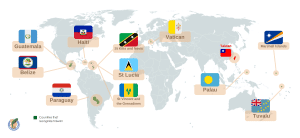PNN – In recent days, officials of Taiwan have made several trips to the Green Continent in search of new allies in Europe, an action that is considered to be in conflict with China’s policies in this region and has aroused Beijing’s concern even more.
According to the report of Pakistan News Network, Taiwan’s Foreign Minister Lin Chia-lung wrapped up a week-long trip to Europe in recent days after meeting with European lawmakers in Brussels and overseeing efforts to deepen bilateral cooperation in drone technology development between Taiwan and Lithuania.
Before that, Tsai Ing-wen, the former president of the island of Taiwan, had traveled to the Czech Republic in order to gain international support and create new coalitions against what he called threats from the Chinese central government.
Before the start of the presidency of Lai Ching-te, the current president of Taiwan, Hsiao Bekhim, his deputy, had traveled to four European countries, including Belgium, the Czech Republic, Lithuania and Poland.
Analysts say these trips are part of Taiwan’s ongoing efforts to deepen engagement with European countries and reflect the current administration’s efforts to focus on facilitating practical and tangible cooperation with individual countries.
Considering that Taiwan is not recognized as an independent land by the countries of the world, it tries to build common interests with the leaders of various countries, especially in Europe, by establishing economic and strategic relations instead of diplomatic relations.
The meetings come as China has launched a diplomatic campaign aimed at isolating Taiwan from the international community since Tsai Ing-wen took office as Taiwan’s president in 2016.
Analytical website of international relations wrote in a report referring to this campaign: Over the past few years, China has systematically targeted Taiwan’s diplomatic allies and tried to convince them that cooperation with China would be more beneficial for their economic prosperity and sustainable development, and in practice this approach has been successful.
Meanwhile, Beijing has prevented Taiwan from participating in intergovernmental forums. In the summer of 2024, the member states of the World Health Organization (WHO) refused to invite Taiwan as an observer at the 77th World Health Assembly (WHA) due to the objections of China, which considers this self-governing island an integral part of its territory.
This report states: China’s efforts to isolate Taiwan have several main goals. Beijing wants to make Taiwan diplomatically vulnerable to any potential conflict in the strait, by preventing Taipei from participating in intergovernmental forums and forcing other countries not to formally recognize Taiwan as an independent country, seeking to limit its ability to Taipei is seeking diplomatic support.
On the other hand, the isolation of Taiwan increases the possibility of negotiations with China. Beijing anticipates that as the region’s global standing weakens, Taipei will be more willing to engage in bilateral negotiations on terms favorable to China. China is seeking to push for talks based on the 1992 Consensus, which states that both sides of the Taiwan Strait belong to China.

Beijing strongly wants to prevent foreign forces from interfering in Taiwan’s affairs, both governmental and non-governmental, because key decision-makers in China see foreign interference as the main obstacle to the reunification of China and Taiwan. America is the most important interventionist in this field.
The analytical website of international relations adds in its analysis: Beijing’s goal in pursuing a strategy to isolate Taipei diplomatically is to prevent or limit Taipei’s diplomatic interactions. China has imposed sanctions on countries that allow Taiwan to have a diplomatic office on its soil, including trade restrictions, suspension of freight trains and import bans.
According to this report, China’s fourth and final goal is to delegitimize and discredit the concept of “government” in Taipei. By isolating Taiwan internationally, Beijing is trying to make Taiwan’s sovereignty appear as an illegitimate political entity and undermine the concept of the “Taiwan State”. Before the presidency of Tsai Ing-wen, Taiwan actively participated in various international forums such as the World Health Organization (WHO) and the International Civil Aviation Organization (ICAO) under the title of “Chinese Taipei”. This was the result of an understanding between Beijing and Taipei during the presidency of Ma Ying-jeou in Taiwan. Taiwan’s exclusion from international forums reinforces Beijing’s narrative that the region’s status is ambiguous and ultimately subordinate to China.
Western observers have always accused China of exerting pressure on Taiwan through an extensive diplomatic campaign and believe that by isolating Taipei, Beijing is trying to minimize foreign interference in what it considers to be its internal issue.

